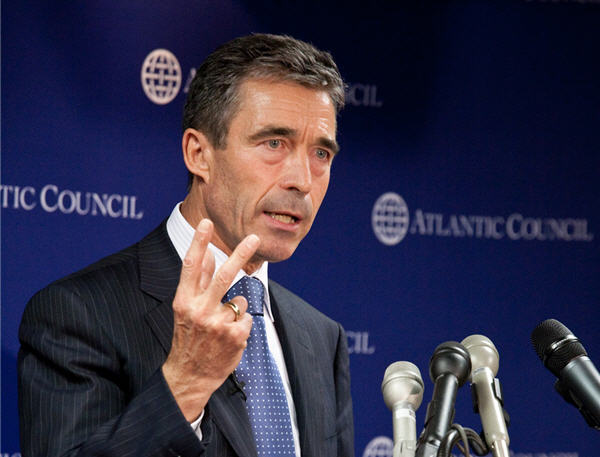 In his first U.S. speech as NATO Secretary General, Anders Fogh Rasmussen stated that, while “NATO will stay” in Afghanistan “for as long as it takes to succeed,” the political and strategic realities make it clear that “things are going to have to change” and quickly.
In his first U.S. speech as NATO Secretary General, Anders Fogh Rasmussen stated that, while “NATO will stay” in Afghanistan “for as long as it takes to succeed,” the political and strategic realities make it clear that “things are going to have to change” and quickly.
Partly, he declared, the problems with domestic support being felt in virtually all Alliance countries are a function of a failure of communications by their political leaders. In short, the public has not been shown how much has already been accomplished. He ticked off a list:
- 7million in school, on third of them girls
- 85% of citizens have access to basic health care, up from 6% a few years ago
- millions voted in the last election, despite Taliban death threats
- women walk streets, hold jobs, and sit in parliament
- Al Qaeda has no bases and is no longer a launch pad for attacks against the West
“These are huge achievements in just eight years,” Rasmussen declared, but “the truth is this mission can not last forever.”
With this in mind, we must begin the transition to Afghan leadership, province by province, with international forces shifting to a supporting role. “It means Afghans running their own schools, their own hospitals, their own government.” He declared that, if we can show success on these fronts, “our publics will continue to support this mission through to success” Otherwise, “it will be impossible to sustain public support for this mission over the long term. Sooner rather than later, transition must begin.” He quickly added: “Let no one spin this as a run for the exits. It is not. NATO will stay for as long as it takes to succeed. And I want to repeat that: as long as it takes. But that cannot mean forever.”
Rasmussen joked about the recent leaks of large portion of General Stanley McChrystal’s “highly classified” strategic assessment as pointing to the dire costs of failure in Afghanistan and Pakistan, declaring it urgent for NATO members to understand that “Territorial defense begins far away from our own borders.” In response to Council president Frederick Kempe, Rasmussen said he shares the assessments in the leaked McChrystal report. “It would be premature to make any judgment here and now as regards the resource question. We must go through his analysis and form agreement within the Alliance. BUT one thing is clear to me: That we must increase our resources for the training mission.”
In response to a question from Harlan Ullman on the feasibility of putting a massive civilian force under NATO command, he again declared it “premature” until we have consensus on our goals: “Strategy first, resources second.” That said, “We definitely need improved coordination” and “more UN input.”
This is all very well taken. Certainly, we tend to overlook the successes already achieved, which are substantial. But it’s far from clear that we will obtain a consensus in the United States Government — much less those of all 28 NATO member states — on a strategy. Indeed, we’ve been fighting a war for nearly eight years in the absence of a clear strategy, aside from some rather vague goals about extremism and governance.
Morever, while it sounds good to say that NATO will “stay as long as it takes to succeed,” it’s hard to reconcile with the political realities on the ground. While some NATO states are indeed ramping up support, most are on their way out. And while all 28 states have had a presence in Afghanistan and many have taken casualties, a handful of done the bulk of the fighting and dying. There’s little evidence that this will change.
James Joyner is managing editor of the Atlantic Council.
